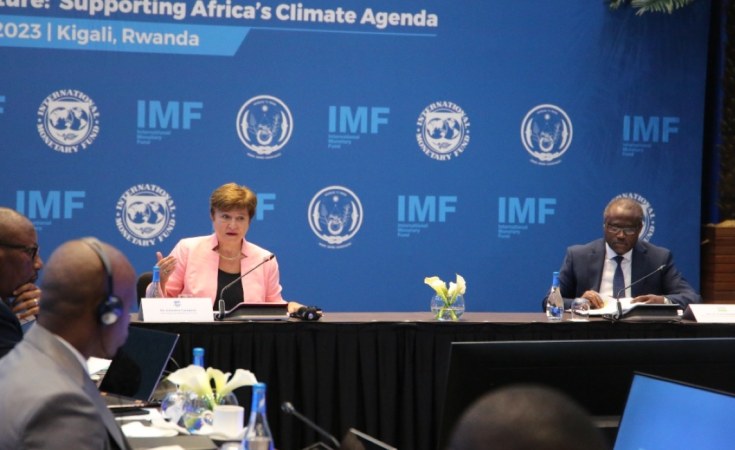While Africa is constantly assured that it holds a well-deserved seat in climate financing negotiations, leaders have informed the International Monetary Fund (IMF) that the process involved in acquiring such funding is still burdensome.
This was made clear during a roundtable discussion between Kristalina Georgieva, Managing Director of the IMF flanked by her delegation and East African finance ministers and Central Bank Governors on January 25.
ALSO READ: IMF Boss on Rwanda's economic potential, climate championship
Georgieva is in Rwanda on a three-day working visit that, among others, seeks to elaborate climate financing schemes for developing countries and the operational context of the IMF's Resilience and Sustainability Trust (RST).
She noted that it is extremely important that Africa is at the front and center in climate finance negotiations for "Africa has contributed very little to the problem...but it is already suffering the consequences of climate change in a very dramatic way."
Rwanda is the first African country to secure a $319 million loan under the RST - an initiative that aims at helping low-income and vulnerable middle-income IMF members address longer-term structural challenges such as climate change with longer-term low-cost financing.
Besides Rwanda, only Barbados, Costa Rica, and Bangladesh have benefited from the facility so far.
For some years now, the topic of climate change has been a priority in many meetings of pressing global issues as a result of long-term developmental actions taken by countries without considering the future impact they would have.
ALSO READ: Climate crisis threatens Africa's development - Kagame
To take effective measures, countries have to limit global warming to 1.5 degrees Celsius by 2030.
To achieve this, carbon emissions must be reduced between 25 and 50 percent to where they were in 2019 by 2030. However, according to Georgieva, implementing the total pledges made would only reduce them by 11 percent.
In Rwanda, it is projected that if nothing is done in the next decade, the negative impact of climate change would take away about five to seven percent of GDP, according to Uzziel Ndagijimana, the Minister of Finance and Economic Planning.
While the country seeks to reduce carbon emissions by 38 percent in 2030, the cost of mitigation and adaptation measures is estimated at $11 billion (about Rwf11.2 trillion).
With the continued resources mobilization for the climate action plan, the gap stands at $7 billion of the needed amount.
ALSO READ: Rwanda launches over $100m green investment facility
Ndagijimana said that to achieve climate targets, it requires innovation in mobilizing resources such as greenbonds, blended financing, and private partnerships.
Chris Kiptoo, the Principal Secretary of Kenya's National Treasury, said that although most African countries pledged to allocate 10 percent of their budget for climate response and 90 percent fund from foreign countries, the issue remains in accessing the funds, especially the process required to benefit from the RST.
Georgieva noted that countries need to present credible data on climate change impact and different strategies adopted in mitigation and adaptation to strengthen their portfolios.
"We believe that developing countries deserve to have access to long term financing to underpin their structural transformation, the investment in climate resilience and low carbon development," she said.


